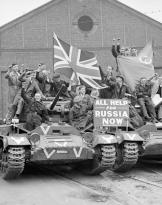Unveiled by private correspondence between a scion of the Rothschild family enlisted in his Majesty's secret service and an English painter, a Nazi plot to kill Sir Winston Churchill.
Seventy years later, historical documents reveal that it should have been a chocolate bar filled with explosives that eliminated the British prime minister in the second phase of World War II.
Wrapped in a refined black paper with golden writing, an inviting bar of dark chocolate Peter's Chocolate placed on the breakfast table at the 10 on Downing Street it should have exploded killing anyone within a radius of at least 5 meters.
To discover the conspiracy the baron Victor de Rothschild, in peacetime biologist and formidable player of Cricket, during the war agent of the MI5 to head of the B1C "section explosives and sabotage".
As soon as the Germans' intention was to deliver inviting deadly chocolate bars to starvation England, Lord Rothschild informed the secret services and commissioned the son of a police inspector friend of his, Lorenz Fish, a young self-taught painter, to put up posters to guard all English subjects: once triggered you have 7 seconds before the detonation. This is demonstrated by a letter written from his secret bunker on Parliament St. dated May 4, 1943.
In the letter, classified as "secreta" and found by his wife Fish after the death of the artist, it reads: "Dear Fish, I was wondering if you could draw for me an explosive chocolate bar?" - continuing then - "We have received information that gives us reason to believe that the enemy is planning to use chocolate bars that hide steel covered with a layer of real chocolate (...) Inside it would be found highly material explosive and a delayed trigger mechanism (...) When one goes to commonly break the first piece of the bar, instead of detaching, a cloth webbing present inside it solicited would trigger the device. "
Baron Rothschild for the entire duration of the conflict, between espionage and counterespionage, attempted to sabotage and counter sabotage attempts by the Germans. He was awarded the George Cross, the recognition for those who stand out in "acts of great heroism and courage shown in circumstances of extreme danger".












